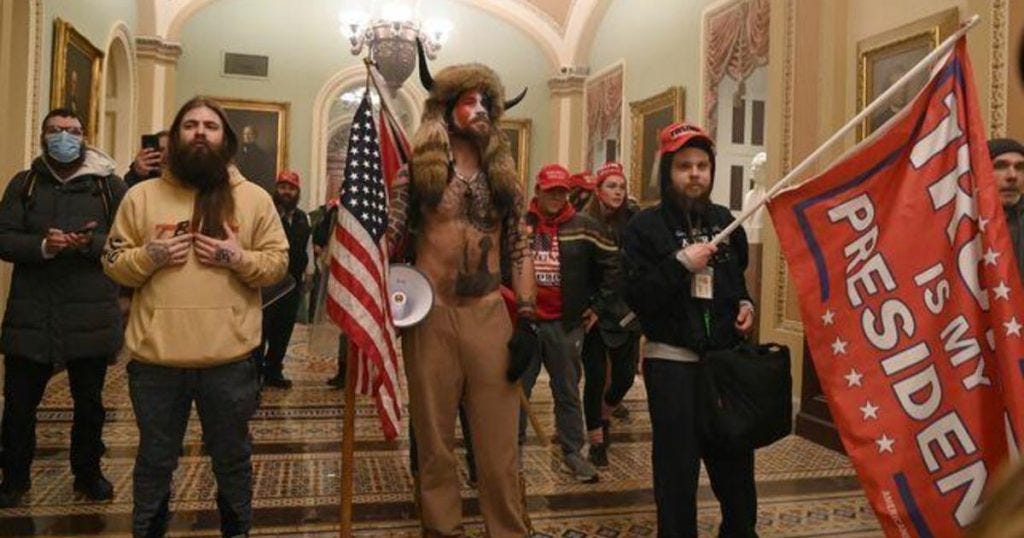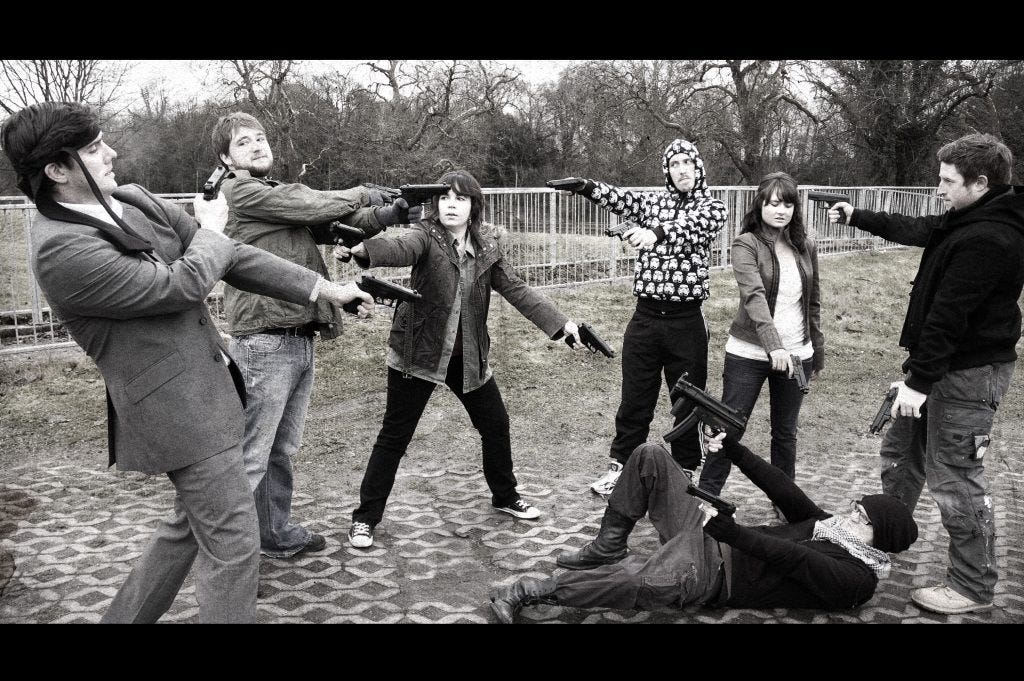What's So Bad About Storming the Capitol?
I mentioned on FB that the Capitol riots were exactly the sort of thing Putin was hoping for when he supported Trump for President. Some people were either outraged by the obvious truism or confused as to how I could say this.
I'm not sure why, exactly; I assume they invented some thesis tangentially related to my words, put that thesis into my mouth in their imagination, and then reacted with anger/confusion. That's what people usually do. Some of them probably imagined that I said, "Trump colluded with Russia!" Others probably imagined, "Blue tribe > red tribe", or, "The Capitol building is sacred!"
Anyway, it happens that I was not on board with the Capitol riots. I wouldn't have joined in, and I hope that some people get prosecuted for it. But wait! Aren't I an anarchist? Shouldn't I then applaud such "anarchic" behavior? I guess that's what some people thought.
So I thought I would explain my problem with the riots and why I find them a bad sign.
How Did We Get Here?
Social Norms Keep Us from Killing Each Other
But first, I'm going to comment on what led us to this point. I've commented on this before, but that was before the riots, and I think my point will have more force now.
The first thing to understand about humanity is that most human beings have very little character. They have minimal moral motivation (https://fakenous.net/?p=272), and weak internal motivations in general. They are easily swayed by circumstances, especially by people around them. So the reason why your neighbor doesn't grab your wallet or punch you in the face when you annoy him is not that it would be wrong to do so. The reason is that it's against the social norms -- he doesn't see other people doing that, he knows that other people would disapprove of it, and society might punish such behavior. That's really the main reason.
People's allegiance to social norms is emotional, not intellectual. They just feel like they have to follow the norms. So they're not very subtle about it -- e.g., people aren't very good at distinguishing good social norms from bad ones. Also, some of the norms are vague and general, like "Treat people with a certain level of respect, even when you disagree with them."
The most valuable thing that America has -- the thing that makes things go better in innumerable ways than the way they go in 99% of other societies -- is not its wealth, nor its particular laws and policies, nor even its Constitution. The most valuable thing is a set of norms and institutions that managed to take hold and become stable. Or at least metastable.
How Norms Erode
Social norms can be eroded. The way they get eroded is essentially by visible norm-violations that are visibly tolerated. If you see other people around you flagrantly violating the (erstwhile) social norms, and if nothing happens to those people, or maybe they are even rewarded for their behavior, then your feeling that you have to follow social norms diminishes. You start to feel like maybe you're living in a free-for-all zone and you can do whatever the hell you feel like. Unfortunately, what most people feel like doing is not good.
Conservatives, by the way, like this sort of theory when it comes to explaining crime. According to the "broken window theory", if people see broken windows around the neighborhood which don't get fixed, then they feel encouraged to commit other crimes, including more serious ones. (Similarly for graffiti and other minor law-violations.)
It's Happening in America Now
I'm sure you've seen it. Everyone comments on how America has been becoming more divided for the past several years. One manifestation of this division is the breakdown of respectful discourse. We have people insulting and demonizing each other over political differences all the time.
It wasn't always like that. Here's a video clip from a famous moment in the 1980 Presidential debates: https://www.youtube.com/watch?v=qN7gDRjTNf4. That's how people used to argue about politics. Notice that Carter attacks Reagan pretty seriously, but he nevertheless does it in a restrained, civil manner. It's clear that this event is under control. Contrast that with the 2016 or 2020 Presidential debates.
To state the obvious, Mr. Trump has been a major force for norm-erosion in the past few years. Think about the number of times people's heads were exploding over something he said or tweeted (see https://fakenous.net/?p=681). You might think, "Oh, who cares? It's just words." But the reason people's heads were exploding was that he was openly flouting extremely well-known, well-established norms, norms that almost all people in polite society respect all the time. (The reactions people had show that he was in fact doing that.) I thought this was the biggest thing that the 2020 election was about (https://fakenous.net/?p=1965) -- it wasn't about immigration, or the economy, or even Covid-19.
Apart from his disrespectful discourse, one of Trump's most shocking norm-violations consists of openly disregarding truth. In human societies in general, there's a norm of not lying. This is shown partly by the fact that if you lie, and you are caught, you try to make excuses, or apologize, or something like that -- you don't just repeat the lie and insist that the other person is lying. Also, you don't lie in the first place if you already know that about 50% of your audience is going to immediately recognize the lie. For example, if you're in a room of 100 people, and 50 of those people just saw you steal money from a cash register, and all 50 saw each other watching you do that, you don't just say, "I didn't do it" then accuse someone else of doing it.
We also saw that Trump visibly got away with his blatant norm-violations. He was in fact rewarded for it, about as handsomely as one could be. Because of his position, he probably has a much greater influence on respect for norms than others do. If some radio host goes around flouting norms, it's not such a big deal. If the U.S. President is doing it, that's a much bigger signal to our emotional mechanisms that we're living in a free-for-all zone.
So I think that is part of the story of why a mob wound up breaking into the Capitol, putting their feet up on people's desks, etc.
But, Both Sides!
Due in part to this polarization that I'm talking about, I can predict that some people will react to that last bit with the familiar whataboutism -- "What about the division that the left is sowing?"
To be clear, I'm not making a stupid partisan point. My point isn't "blue tribe > red tribe" or "only norm-violations by right-wing people are bad". (Though my point does include that Mr. Trump in particular is bad.) I'm also against left-wing people demonizing their political opponents, treating them without respect, and generally flouting the norms that make America successful. I'm against frivolously calling people "racist", comparing them to Hitler, starting up petitions to get people fired for holding conservative views, etc.
I have zero interest, however, in discussing "which side is worse". That is because I'm not interested in using social commentary as a mere pretext for signaling allegiance to a tribe. I'm not looking for chances to strike a blow for my faction; I'm trying to understand our situation and what could make things better.
An Anarchist Against Chaos?
So now, to return to my original question: How can I be against stuff like the Capitol riots, given that I call myself an anarchist?
First, my form of anarchism is not pure social chaos. I don't know if there is anyone who advocates that (certainly not any of the anarchists I know of). Rather, anarchists think that we can have social order through non-governmental means. I.e., we don't need to have a coercive monopoly in order to have stable norms. In the case of anarcho-capitalists, we think market mechanisms can supply law and security. I'm not going to debate whether that's true right now; just accept that that's what I and other anarchists think.
Second, the people storming the capitol were not a bunch of freedom-lovers. My read is that they were largely authoritarians, who simply wanted a specific person to be their dictator. They don't want liberty; they want Donald Trump to dictate to them (and everyone else).
But leave aside their motivations. That's not what matters. What matters is, if they had somehow succeeded in getting Congress to install Trump as President (which I think had about zero chance of happening), the result would have been a collapse of social order in America. There is no way in hell that the other half of the country would have accepted it. There would have been a civil war. This would not have led to orderly, libertarian anarchy; that's not how this sort of thing works. We would have come out of it with either one country or two, but either way, it would be with a lot less freedom and a more dictatorial government. That's what governments do in times like that.
To be clear, I'm not saying that merely challenging election results destroys social order. In America, it's okay to sincerely challenge election results. That happened in 2000, with Bush v. Gore. There was a real issue there. But the challenge was an orderly, legal one -- Gore challenged the election result by filing a legal case. It was then resolved according to established processes that everyone could see -- by the Supreme Court. Btw, that SCOTUS decision was pretty obviously politically motivated, but Gore conceded anyway. He didn't try to undermine the system. When he presided over the counting of the electoral votes the following January, he did not try to overturn the result. And so America continued operating under law and order.
Society is a modus vivendi. There are always different factions who want incompatible things. We put up with some of the bullshit that the other factions want, because we have a general respect for social norms, and because we see the other side following the procedural norms, even though they have messed up substantive values. In game theoretic terms, the established norms and procedures represent a Schelling point in a coordination problem. If one side decides to poop on the procedures, the other factions have no reason to be loyal to the system anymore. Then all bets are off.




